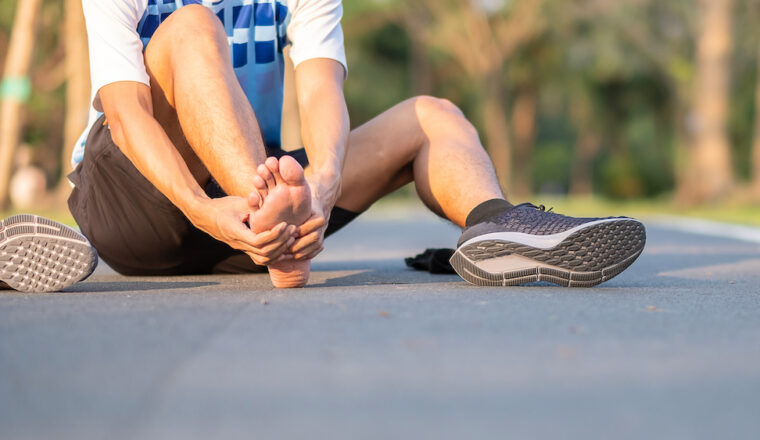Is Plantar fasciitis or that pain on the bottom of your feet, around your heel and arch bothering you? Is it like, “the pain from Plantar fasciitis is so bad, I can’t even walk”?
You may not be the only one. In fact, Plantar fasciitis and regular running seem to go hand in hand. It may be the most common injury for runners simply due to the high-impact activity that runners go through regularly. One study examined 166 runners over 5 years, and 31% reported plantar fasciitis injuries at some point during the study!
This is an issue that needs to be addressed if you want to mitigate your risks and enhance your recovery if you happen to experience this common condition.
In This Article:
Causes and Symptoms
The plantar fascia is a grouping of tissue that runs from your heel to the base of your toes and is made of an inflexible protein substrate called collagen. This tissue is prone to overuse injuries from excessive stress. Here are some of the factors that increase the risk for plantar fasciitis:
- Ages of 40–70
- Pregnancy
- Long-distance running regularly
- Being overweight or obese
- Improper running shoes
- Having a job where you stand/walk on your feet for the majority of the time
While these factors seem to increase the risk for plantar fasciitis, the exact causes aren’t known particularly. It is labeled as an inflammation of the plantar fascia tissue, but it may also be the result of a degradation of the tissue itself instead of inflammation.
The symptoms of this condition build up over time. You will typically feel the pain in the heel or the mid-foot area. The pains can be mild to severe and can feel dull or sharp. Getting up on your feet after a period of inactivity, like sleeping or lounging on the couch, can be quite painful. Walking up the stairs can also be challenging due to the heel’s stiffness that comes along with plantar fasciitis.
Those who have this condition typically don’t feel much pain during exercise or bouts of physical activity. Instead, the pain comes after stopping as the inflammation continues to build after the activity has finished.
How Can Plantar Fasciitis Impact Your Running Performance?
This condition can continue to degenerate over time if you don’t give a rest and care to resolve the aches and pains of plantar fascia. You can certainly continue your running routine if you only experience mild pains and treat them when you aren’t running.
You will typically feel the pain only at the start of a run and after you stop. This means your performance shouldn’t drop much beyond the initial discomfort at the beginning of runs.
If you feel pain throughout the run, it’s time to take a break and deal with the issue at hand before a more serious injury occurs and your running performance drops for weeks to months!
How can Plantar Fasciitis be Prevented?
Preventing plantar fasciitis comes down to limiting your risk-factors. Here are a few tips that can help:
- Periodize your running program so you don’t overly stress your fascia tissue.
- Implement a weight-loss plan to remove excess weight.
- Walk around and perform daily activities barefoot to reduce the risk of improper shoe fittings.
You can also work on flexibility and mobility in your lower extremities, including your joints and muscles. Switch up your training routine to work more in multiple planes rather than your regular running pattern to strengthen stabilizer musculature and encourage more balance.
If your arch is flat or overarched, you may need orthotic inserts for your shoes to support your arch more throughout the day. If your foot is biomechanically balanced already, more barefoot activity may help mitigate the risk for plantar fasciitis.
The issue of plantar fasciitis seems to be caused by overuse for the most part. Proper training and planning around reducing the risk of over-stressing the fascia tissue is your best course of action. This will take multiple different forms, as listed in this section.
How to Treat Plantar Fasciitis at Home for Quick Relief
There are many purported treatments for plantar fasciitis, but many of them haven’t been proven effective through research. Instead, you can approach them on a trial basis for each case. Some of the most common treatments include:
- Wearing cushioned shoes with plenty of arch support over hard-soled shoes.
- Icing your fascia to reduce inflammation build-up in the area.
- Stretching your ankles, calves, and feet up to 3 times a day.
- Taping your arch for more support throughout the day and during runs.
- Using orthotic inserts. OTC works, but a podiatrist will design a custom-fitting insert that will work much better.
- Using a night-splint.
- Implementing self-myofascial release, or SMR on the fascia with something small and dense, like a golf ball.
- A corticosteroid injection can work well for extreme cases.
While many of these treatments are repeated throughout the running industry, it doesn’t mean that they will unconditionally work for you. Rest may be the only treatment you need, while others may need to implement multiple treatments to see any kind of progress.
Be patient and persistent with your treatment, and you’ll be back running pain-free in no time. However, if your condition doesn’t improve in 2 weeks, see a physician.
Key Takeaways:
- Plantar fasciitis is one of the most common injuries for runners and even happens to people who lead a sedentary life.
- The exact cause of this condition isn’t well-known, but many known risk factors can commonly afflict runners.
- The pain typically affects the beginning of a run and also radiates after the exercise has finished. Pain throughout your run should be a sign to stop.
- Taking steps to prevent this condition includes cross-training, mobility work, and other lifestyle adjustments.
- Treating plantar fasciitis can range from easy at-home remedies to working with licensed professionals.
References:
- Cutts, S., Obi, N., Pasapula, C. and Chan, W., 2012. Plantar fasciitis. The Annals of The Royal College of Surgeons of England, 94(8), pp.539-542.
- Wearing, S.C., Smeathers, J.E., Urry, S.R., Hennig, E.M. and Hills, A.P., 2006. The pathomechanics of plantar fasciitis. Sports medicine, 36, pp.585-611.
- Young, C.C., Rutherford, D.S. and Niedfeldt, M.W., 2001. Treatment of plantar fasciitis. American family physician, 63(3), pp.467-475.
- Goff, J.D. and Crawford, R., 2011. Diagnosis and treatment of plantar fasciitis. American family physician, 84(6), pp.676-682.
- Schepsis, A.A., Leach, R.E. and GOUYCA, J., 1991. Plantar fasciitis: etiology, treatment, surgical results, and review of the literature. Clinical Orthopaedics and Related Research (1976-2007), 266, pp.185-196.
- Riddle, D.L., Pulisic, M.A.T.T.H.E.W., Pidcoe, P.E.T.E.R. and Johnson, R.E., 2003. Risk factors for plantar fasciitis: a matched case-control study. JBJS, 85(5), pp.872-877.














